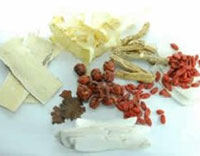Did you hear? A really important consumer update from the FDA was released this month concerning the dangers of taking acetaminophen.
All of us take pain-relievers from time to time, but did you know that one of the most widely used medicines in the U.S. can cause a rare but serious skin reaction? Acetaminophen (Tylenol) can cause 3 serious skin diseases whose symptoms are a rash, blisters, and permanent damage to the skin. If you develop a rash or other skin reaction, or have in the past while taking this drug, stop using it and seek medical attention right away. There is no way to know who will be at risk for these potentially fatal reactions.
Acupuncture and Chinese Herbs have a long history of helping people with pain. Check here if you use any products containing Tylenol (i.e. Midol) for menstrual cramps and period pain. There are alternatives!



 I having been surrounded (quite literally) for the past three days by so called “healthy products”, everything from fortified lolly pops, safer nail polish to every type of infused water possible. I had three days of endless conversations with wellness experts from around the world, Naturopaths, Dieticians, Chiropractors, Acupuncturists, Herbalists, Homeopaths and Bio-Chemists to name a few. Every health professional I spoke to had the same resounding theme, the key to better health is not in any one of these hot new health products that you’ll find at the Natural Products Expo and later on a
I having been surrounded (quite literally) for the past three days by so called “healthy products”, everything from fortified lolly pops, safer nail polish to every type of infused water possible. I had three days of endless conversations with wellness experts from around the world, Naturopaths, Dieticians, Chiropractors, Acupuncturists, Herbalists, Homeopaths and Bio-Chemists to name a few. Every health professional I spoke to had the same resounding theme, the key to better health is not in any one of these hot new health products that you’ll find at the Natural Products Expo and later on a 
 If you’ve been suffering from PMS and menstrual cramps, adding a 1 gram capsule of mixed essential fatty acids to your daily diet could help reduce your symptoms say’s a group of researcher in Brazil. This is not the first research to link PMS and essential fatty acid (EFA) intake. Since our bodies can only produce fatty acids, (long chain molecules) from the foods we eat, then our bodies will be deficient if
If you’ve been suffering from PMS and menstrual cramps, adding a 1 gram capsule of mixed essential fatty acids to your daily diet could help reduce your symptoms say’s a group of researcher in Brazil. This is not the first research to link PMS and essential fatty acid (EFA) intake. Since our bodies can only produce fatty acids, (long chain molecules) from the foods we eat, then our bodies will be deficient if
 Another day and another friend/mother/sister/daughter diagnosed with breast cancer. Today breast cancer is affecting one in every eight women sometime during their lifetime in the USA, Europe and the UK. Looking around at my friends, family and extended family we need no reminders of the impact of these statistics. But there is good news, actually GREAT news– medical researchers at the Institute of Molecular Biotechnology (IMBA) of the Austrian Academy of Sciences in Vienna identified a key protein that triggers breast cancer and in December 2012 received a grant of $7.4 million from the USA Congressionally Directed Medical Research Program for ongoing research.
Another day and another friend/mother/sister/daughter diagnosed with breast cancer. Today breast cancer is affecting one in every eight women sometime during their lifetime in the USA, Europe and the UK. Looking around at my friends, family and extended family we need no reminders of the impact of these statistics. But there is good news, actually GREAT news– medical researchers at the Institute of Molecular Biotechnology (IMBA) of the Austrian Academy of Sciences in Vienna identified a key protein that triggers breast cancer and in December 2012 received a grant of $7.4 million from the USA Congressionally Directed Medical Research Program for ongoing research.